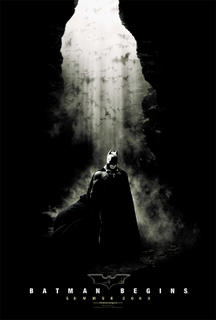 Forget all you remember about the previous four Batman films. Eradicate from all conscious and subconscious thought the existence of the 1960’s TV series. This is a serious treatment of the story of Bruce Wayne, perhaps the most serious ever. Batman Begins is set apart from the earlier treatments not simply because it focuses on the characters, but it also places them in a larger framework of human and societal issues.
Forget all you remember about the previous four Batman films. Eradicate from all conscious and subconscious thought the existence of the 1960’s TV series. This is a serious treatment of the story of Bruce Wayne, perhaps the most serious ever. Batman Begins is set apart from the earlier treatments not simply because it focuses on the characters, but it also places them in a larger framework of human and societal issues.Batman Begins is not a particularly spiritual film, but it is a deeply human film. It addresses the human experience of fear, anger, guilt, and compassion. In the first half of the story, Henri Ducard (Liam Neeson) invites Bruce Wayne to study the martial arts and join the League of Shadows in their pursuit of justice. Yet, to join the league Ducard reaches into Wayne’s psyche. Through flashbacks we learn Bruce Wayne’s past and his fear of bats. That fear gave birth to guilt and self-hatred for the death of his parents at the hands of a common criminal. Eventually his guilt was covered over by the callous of anger and revenge. The film deserves to be commended simply for opening a balanced and introspective conversation about these problematic human emotions (see Genesis 4), but it excels in that it broadens the conversation into our societal experience of these inner demons.
Batman Begins uses Gotham City as a symbol for our society and culture. This is the most genuine rendition of Gotham City ever. One believes that it could actually exist in our world rather than only on a soundstage or an art deco poster. Gotham is a city ruled by fear and anxiety. Criminal bosses take advantage of the desperation bred by the anxiety. They keep good people from improving the society by keeping them blissfully entertained and insulated from the desperation of the criminal underworld. As one of the criminal bosses says to Wayne, “Ignorance is bliss, my friend. Don't burden yourself with the secrets of scary people.”
The unfortunate result of insulating the noble and wealthy people of Gotham from the problem is that the good people who have the power and means to make a difference do nothing. The exception is Thomas Wayne, Bruce’s father. He invests himself and his resources into saving the city. He meets fear and evil with compassion and courage. Bruce’s personal journey in the film involves his definition of justice. Does justice involve compassion, which is his father’s way, or does it involve anger and revenge, which is the way of Ra’s Al Ghul and the League of Shadows?
Bruce Wayne becomes Batman so that he can strike fear into the hearts of those who prey on other’s fears. However, in becoming what they fear he must be careful not to lose his own soul or he only becomes a meaner, nastier criminal than the other criminals. His moral compasses are his friend Rachel Dawes and his butler, Alfred Pennyworth. Rachel reminds him of the legacy of his father. She reminds him of the importance of doing the right thing, which is of greater importance than theatricality and deception. Alfred keeps Bruce Wayne encouraged when all hope seems lost but he also presses him to focus on that which matters most. Because of his good influences, Bruce Wayne becomes more than an avenger; he becomes a hero.
This discussion of revenge, compassion, and justice is extremely relevant to our social situation. Are we weak when we show compassion or do criminals deserve unbridled punishment and revenge? What does it mean to be truly fearless? Does it mean we are strong enough or clever enough to destroy any foe, or does it mean we can maintain our integrity and resolve even in the face of danger and anxiety? This film is a good dialogue for these very human issues given the situation in our Gotham City. Terrorists are brokers of fear. Those who seek to control our culture and society through politics, media, and the institutions of our society wield fear as a tool. (For another treatment of this topic read Michael Crichton’s State of Fear or peruse the following review of the book.)
Batman Begins should urge people of faith to consider the importance of compassion - how it separates us from the criminals and how it takes more courage to be compassionate than it does to be angry and vengeful. After all, what chance does Gotham have, when the good people do nothing?
1 comment:
Chirs, My daughter has started a blog entitled, Kidz Kritic - seeing movies from a kid's perspective. Well, kids movies from a kids perspective. She can't stand adults reviewing movies like The Cinderella Story, Sisterhood of Traveling Pants, etc. See, you've inspired a new generation! www.kidscritic.blogspot.com Check it out!
Post a Comment